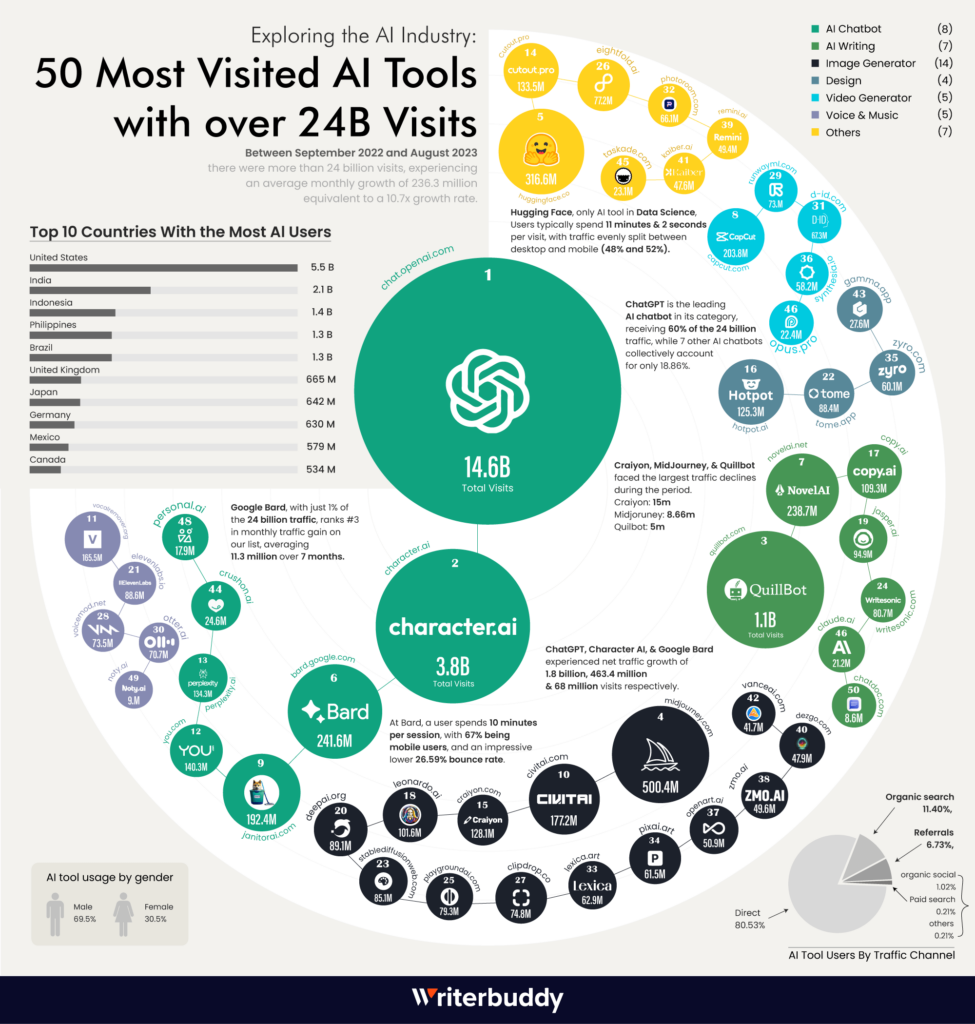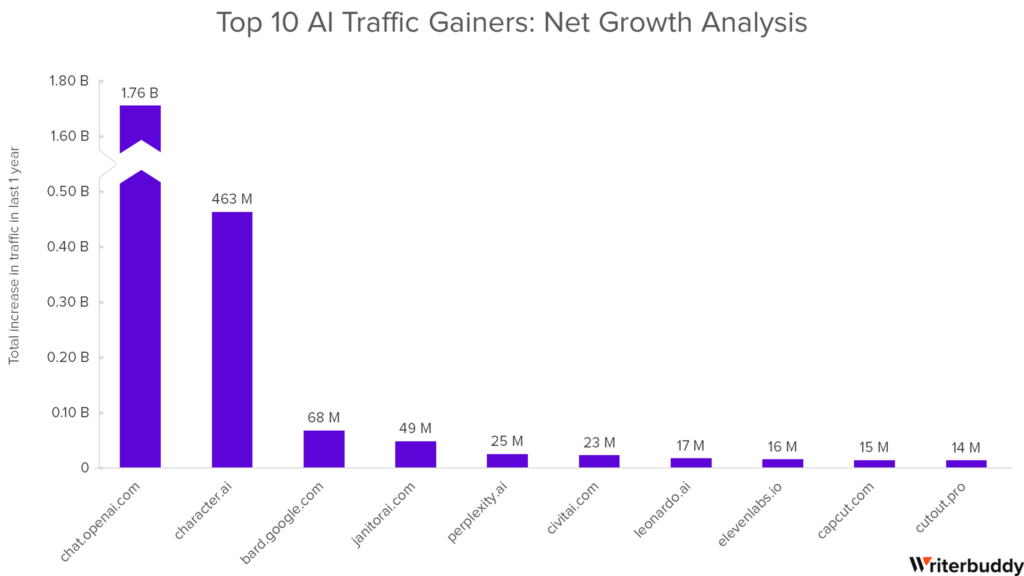The recent data revealing a collective 24 billion visits to the top 50 AI tools between September 2022 and August 2023 paints a picture of a world increasingly intertwined with artificial intelligence (AI). This number is not merely a statistic; it’s a story of our times, a narrative that underscores the burgeoning role of AI in shaping our digital existence. As these tools permeate various aspects of life and business, they bring about a paradigm shift in how we interact with technology, solve complex problems, and streamline operations.

The Unrivaled Supremacy of ChatGPT
ChatGPT, with its staggering 14 billion visits, accounting for over 60% of the total traffic to these AI tools, has established itself as a cornerstone in the AI revolution. Its dominance is not just in numbers but in the value it delivers across diverse sectors. From enhancing customer service with its conversational prowess to aiding educators in creating interactive learning experiences, ChatGPT is at the forefront of AI-driven communication. Its success is rooted in its advanced language processing abilities, which enable it to understand and respond to human inquiries with remarkable accuracy. This capability has made ChatGPT an invaluable asset in industries like retail, healthcare, and finance, where understanding and responding to human needs is paramount. Beyond its immediate applications, ChatGPT’s influence extends to setting new standards in AI ethics and governance, challenging developers and policymakers alike to consider the implications of such powerful technology.
Diversity and Innovation in AI Tool Offerings
The array of AI tools available today showcases the breadth and depth of innovation in the field. These tools, ranging from generative AI that aids in creative processes to complex data analysis tools for business intelligence, cater to a wide spectrum of needs. The diversity is a reflection of the evolving demands of industries that seek AI solutions for efficiency, precision, and creativity. Tools like Munch are prime examples of this innovation, blending AI with marketing analytics to derive impactful insights and content. Others focus on predictive modeling, customer behavior analysis, and even solving complex logistical problems. This variety in AI tools indicates a maturing market where AI is not a one-size-fits-all solution but a versatile technology that can be tailored to specific industry requirements.
AI’s Pivotal Role in Marketing Evolution
AI’s transformative impact on marketing is particularly noteworthy. The rise of over 50 AI tools dedicated to marketing is a clear indication of the sector’s rapid evolution. These tools are not just enhancing traditional marketing techniques but are redefining them. Marketers now have at their disposal tools that offer deep insights into customer behavior, enabling personalized marketing strategies and real-time data analysis for more effective campaign management. AI in marketing goes beyond data analysis; it’s about creating experiences that resonate with consumers, leveraging AI’s ability to understand and predict consumer preferences. This paradigm shift is leading to more effective marketing strategies, higher customer engagement, and ultimately, better business outcomes.
Shifting User Preferences and Market Dynamics

The dynamic nature of the AI industry is perhaps best exemplified by the shifting user preferences and market trends. The rise and fall in the popularity of tools like Craiyon and MidJourney highlight the fast-paced and ever-evolving tech landscape. These shifts are not just about changing consumer tastes but also about the rapid technological advancements that are constantly reshaping the market. The AI industry, therefore, is one that demands continuous innovation, agility, and foresight. The ability to anticipate market trends, adapt to changing user needs, and continuously improve and innovate is key to succeeding in this competitive space.
Also read: Revolutionizing Digital Asset Management: Liminal’s New Partnership with Bitwyre in Indonesia
AI Revolution: A Broader Impact Analysis
The impact of AI on various sectors is profound and far-reaching. Beyond the impressive traffic numbers lies a transformation that is reshaping industries and redefining societal norms. From automating routine tasks to enabling informed decision-making, AI is changing the way businesses operate. It’s not just about operational efficiency; AI is enabling new business models, opening up new markets, and creating opportunities for innovation and growth. The integration of AI into various sectors represents a fundamental shift in how businesses approach problems and opportunities, leading to more efficient processes, enhanced customer experiences, and new ways of working.
The 24 billion visits to the top 50 AI tools underscore the significant role AI plays in our digital world. The influence of AI is extensive, reshaping industries and enhancing user experiences. As we embrace this AI-driven era, it is crucial to balance innovation with ethical considerations, ensuring a sustainable and responsible future for AI.
















